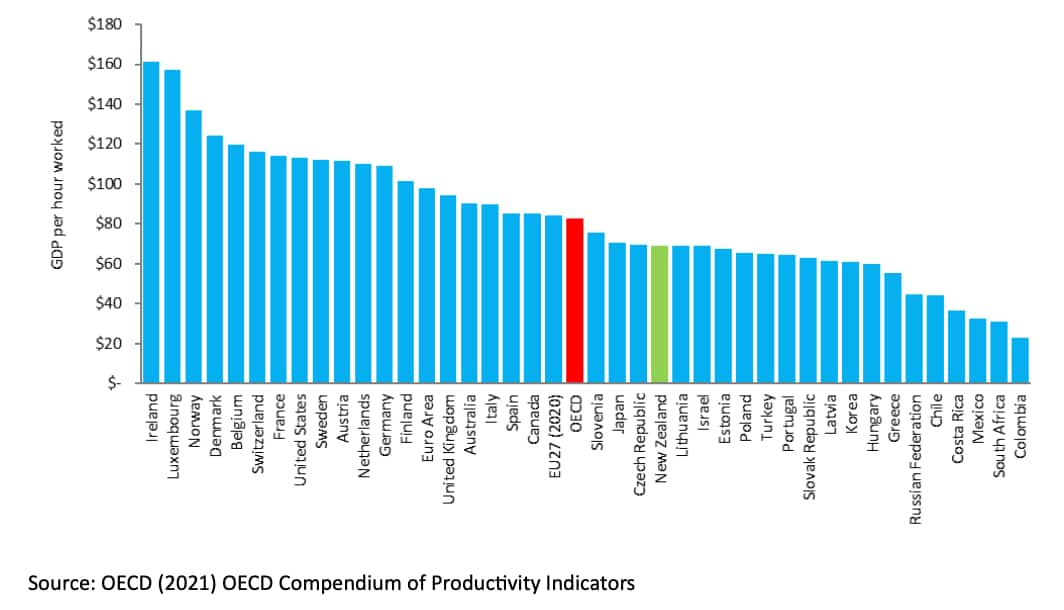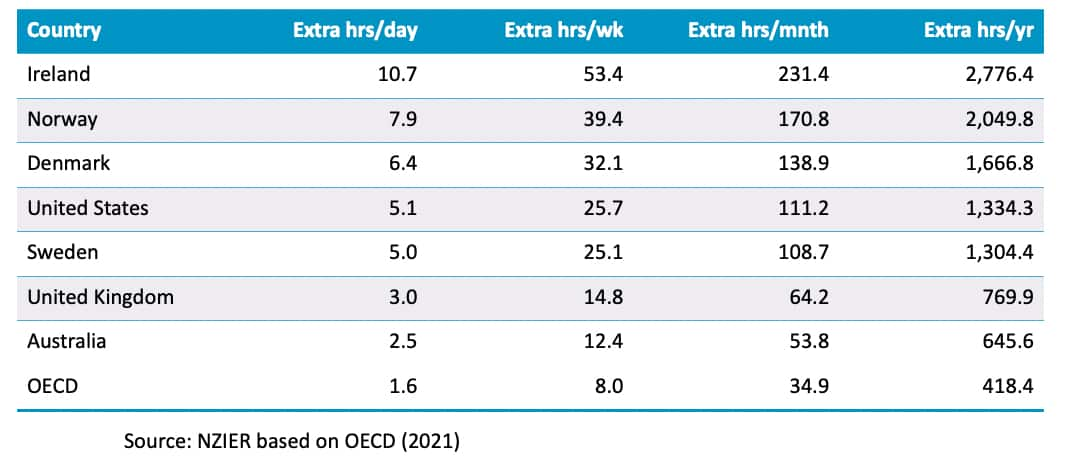Kiwis need to work 10 more hours per day to match output of most productive country
Xero points to digitalisation to improve New Zealand’s productivity
Wellington — 22 August, 2022 — Xero, the global small business platform, today released new economic insights revealing Kiwis are generating significantly less output for each hour worked than the most productive nations in the OECD.
The latest insights from the New Zealand Institute of Economic Research (NZIER) show New Zealanders are working longer hours, positioned eleventh out of 34 countries for average hours worked per worker.
These long hours do not deliver as much value to Aotearoa compared to its international counterparts.
Bridget Snelling, Xero New Zealand Country Manager, says NZIER’s insights show the country’s labour productivity is below the OECD average and is operating at less than half of the most productive nation, Ireland. She says New Zealand has a great opportunity to improve productivity through digitalisation.
“Every day New Zealanders are working more than our international counterparts, with much less to show for it per hour. In fact, Kiwis would need to work 20 percent more to reach the average OECD GDP output. For Kiwis working a 40-hour work week, this is equivalent to working an extra day per week to make up the labour productivity gap, and that’s just to reach the average productivity mark.

“For business owners, it would be the equivalent to hiring one more employee for every five current employees. This is a near impossible challenge at the moment, considering the tight labour market,” says Snelling.
NZIER has broken down the extra hours required to match the output of the most productive OECD nations.

“The Irish are world leaders when it comes to GDP productivity per hour. For Aotearoa to match this output at our current productivity rates, Kiwis would need to work an additional 10.7 hours per day, or a jaw dropping total of 53.4 hours per week.
“Obviously this is impossible, but it asks the key question - what must New Zealand businesses do to bridge this gap and accelerate productivity?” Snelling adds.
Digitalisation is an important element
Snelling says it’s clear there’s a productivity issue in Aotearoa and getting more people to work longer days is not the solution.
“Kiwis aren’t afraid of a bit of hard work, especially those in the self-made small business sector. But these sobering numbers make it clear that we can't simply put our heads down and work our way to better productivity.
“As a nation, we must get more from the hours we put in. To do this we need to think long term and take action.”
Productivity is complicated with many contributing factors, increasing business digitalisation is one key element.
Xero and NZIER have economic research that shows a 20 percent increase in the uptake of cloud computing could increase New Zealand’s GDP by between $3.5 billion and $6.2 billion through labour savings and productivity improvements.
The government has set up the Digital Boost website to help small businesses get started on their digital path. To further encourage small businesses to get started, Xero is advocating for the Government to implement a scheme similar to comparable economies such as Australia and Singapore where SMEs can deduct a percentage of their investment in adopting digital technologies.
Snelling says: “Right now businesses across Aotearoa are spending a huge amount of time on tasks that can be automated or done more efficiently with the help of an app. We need to ensure every hour spent working is doing something only a human can do, this will unlock huge productivity benefits.
“Some small business owners may feel their line of work isn’t suited to apps and cloud based tools, but there are more than 1000 apps connected to the Xero alone, many of which are specifically designed to help specific industries. If you want advice on what apps will best support your business, try talking to your accountant or bookkeeper,” says Snelling.
The benefits of eInvoicing
One important step towards Aotearoa businesses becoming digitalised is the adoption of eInvoicing.
The Ministry of Business, Innovation and Employment (MBIE) published information about the benefits of eInvoicing for Kiwi businesses.
Snelling says despite its simple name, eInvoicing isn’t just online invoices. It’s a growing technology that’s changing the way businesses are run around the world.
“eInvoicing automates the sending, receiving and payment of invoices. With 280 million business-to-business invoices exchanged in New Zealand each year, the government estimates our economy could save $4.4 billion over the next 10 years.
“The benefits of eInvoicing include faster payment times which improves cash flow, reduced admin and human errors, improved online security and more. It also has direct cost savings with an eInvoice costing businesses less than half of a traditional invoice.”
Small businesses looking to introduce eInvoicing should visit the government’s eInvoicing website, Xero’s eInvoicing hub, or speak to their accountant.
Snelling says digitalisation isn’t the only answer to Aotearoa’s productivity problems, but it’s something self-made businesses across the country can immediately start looking into.
ENDS
Media Contact
Sophie Hoult | Xero Communications | sophie.hoult@xero.com
Related media and enquiries
For all media enquiries, please contact the Xero media team.
- Media release
Government and big enterprise vital to small business uptake of eInvoicing
New Xero survey reveals the important role large organisations play to help small businesses adopt eInvoicing
- Media release
Cash flow crunch continues to hamper UK small businesses
Xero report reveals the average UK small business now faces more than four months of negative cash flow stress each year
- Media release
Wages and jobs up, sales growth down for Kiwi small businesses in June
Small business owners balancing slowing sales with employee wage demands
Start using Xero for free
Access Xero features for 30 days, then decide which plan best suits your business.